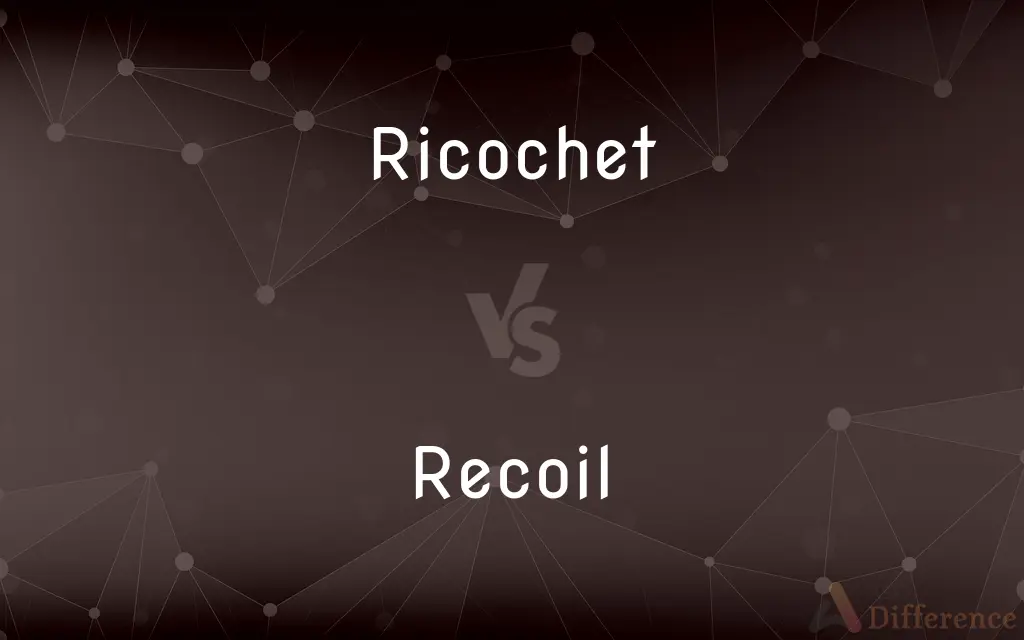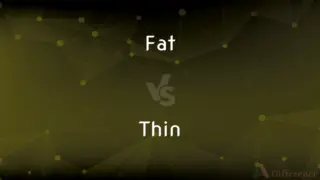Ricochet vs. Recoil — What's the Difference?
By Tayyaba Rehman & Maham Liaqat — Updated on March 20, 2024
Ricochet involves a projectile bouncing off a surface, changing direction; recoil is the backward movement experienced by a firearm when discharged.

Difference Between Ricochet and Recoil
Table of Contents
ADVERTISEMENT
Key Differences
Ricochet and recoil are terms often associated with firearms, but they describe different phenomena. Recoil, on the other hand, refers to the backward movement experienced by a firearm or cannon upon discharging a projectile. It is a reaction based on Newton's third law of motion: for every action, there is an equal and opposite reaction. When a bullet is propelled forward, the firearm moves backward towards the shooter.
Ricochet occurs when a bullet or another projectile strikes a surface at an angle and bounces off rather than penetrating, altering its trajectory. This can happen on hard surfaces like walls or the ground and is influenced by the angle of impact, the projectile's material, and the surface's characteristics. The magnitude of recoil depends on the weight of the bullet, the speed at which it's expelled, and the mass of the weapon itself.
Ricochet poses a safety risk as the new, unpredictable path of the projectile can lead to accidental injury or damage. Recoil management is important for accuracy in shooting and comfort in handling firearms.
While ricochet deals with the behavior of a projectile after it leaves the firearm and interacts with external surfaces, recoil is concerned with the physical response of the firearm itself at the moment of firing. Both concepts are critical for understanding firearm safety, operational mechanics, and the physics of shooting.
Comparison Chart
Definition
The deflection of a projectile off a surface.
The backward movement of a firearm when discharged.
ADVERTISEMENT
Cause
Impact with a surface at an angle.
Discharge of the firearm based on Newton's third law.
Affected By
Angle of impact, projectile and surface material.
Bullet weight, speed, and firearm mass.
Safety Concerns
Unpredictable trajectory posing risk of accidental injury.
Control and accuracy issues for the shooter.
Related to
Projectile after leaving the firearm.
Firearm's response at the moment of firing.
Compare with Definitions
Ricochet
A concern for shooting safety.
The shooting range is designed to minimize ricochet risks.
Recoil
Directly related to the firearm's operation.
High-caliber handguns typically have significant recoil.
Ricochet
Influenced by angle and material.
The steel core bullet ricocheted off the concrete surface.
Recoil
Backward movement of a firearm upon firing.
The rifle’s strong recoil surprised the new shooter.
Ricochet
Observed with various projectiles.
The stone ricocheted across the water’s surface.
Recoil
Affects shooting accuracy.
Expert shooters learn to compensate for recoil.
Ricochet
Can change projectile path unpredictably.
Investigators determined the bullet ricocheted before hitting the target.
Recoil
Result of firing mechanics.
He adjusted his stance to better absorb the shotgun's recoil.
Ricochet
Bouncing off a surface after impact.
The bullet ricocheted off the wall narrowly missing the bystander.
Recoil
Can be managed with practice and equipment.
The use of a recoil pad reduced the shotgun's kick.
Ricochet
A ricochet ( RIK-ə-shay; French: [ʁikɔʃɛ]) is a rebound, bounce, or skip off a surface, particularly in the case of a projectile. Most ricochets are caused by accident and while the force of the deflection decelerates the projectile, it can still be energetic and almost as dangerous as before the deflection.
Recoil
Recoil (often called knockback, kickback or simply kick) is the rearward thrust generated when a gun is being discharged. In technical terms, the recoil is a result of conservation of momentum, as according to Newton's third law the force required to accelerate something will evoke an equal but opposite reactional force, which means the forward momentum gained by the projectile and exhaust gases (ejectae) will be mathematically balanced out by an equal and opposite momentum exerted back upon the gun.
Ricochet
To rebound at least once from a surface.
Recoil
To spring back, as upon firing.
Ricochet
The act or an instance of ricocheting.
Recoil
To shrink back, as in fear or repugnance.
Ricochet
(military) A method of firing a projectile so that it skips along a surface.
Recoil
To fall back; return
"Violence does, in truth, recoil upon the violent" (Arthur Conan Doyle).
Ricochet
An instance of ricocheting; a glancing rebound.
Recoil
The backward action of a firearm upon firing.
Ricochet
To rebound off something wildly in a seemingly random direction.
Recoil
The act or state of recoiling; reaction.
Ricochet
(military) To operate upon by ricochet firing.
Recoil
A starting or falling back; a rebound; a shrinking.
The recoil of nature, or of the blood
Ricochet
A rebound or skipping, as of a ball along the ground when a gun is fired at a low angle of elevation, or of a fiat stone thrown along the surface of water.
Recoil
The state or condition of having recoiled.
Ricochet
A glancing rebound
Recoil
(firearms) The energy transmitted back to the shooter from a firearm which has fired. Recoil is a function of the weight of the weapon, the weight of the projectile, and the speed at which it leaves the muzzle.
Ricochet
Spring back; spring away from an impact;
The rubber ball bounced
These particles do not resile but they unite after they collide
Recoil
An escapement in which, after each beat, the scape-wheel recoils slightly.
Recoil
(intransitive) To pull back, especially in disgust, horror or astonishment.
He recoiled in disgust when he saw the mess.
Recoil
To retreat before an opponent.
Recoil
To retire, withdraw.
Recoil
(of a firearm) To quickly push back when fired
Recoil
To start, roll, bound, spring, or fall back; to take a reverse motion; to be driven or forced backward; to return.
Evil on itself shall back recoil.
The solemnity of her demeanor made it impossible . . . that we should recoil into our ordinary spirits.
Recoil
To draw back, as from anything repugnant, distressing, alarming, or the like; to shrink.
Recoil
To turn or go back; to withdraw one's self; to retire.
Recoil
To draw or go back.
Recoil
A starting or falling back; a rebound; a shrinking; as, the recoil of nature, or of the blood.
Recoil
The state or condition of having recoiled.
The recoil from formalism is skepticism.
Recoil
Specifically, the reaction or rebounding of a firearm when discharged.
Recoil
The backward jerk of a gun when it is fired
Recoil
A movement back from an impact
Recoil
Draw back, as with fear or pain;
She flinched when they showed the slaughtering of the calf
Recoil
Spring back; spring away from an impact;
The rubber ball bounced
These particles do not resile but they unite after they collide
Recoil
Spring back, as from a forceful thrust;
The gun kicked back into my shoulder
Common Curiosities
How do shooters manage recoil?
Shooters manage recoil through proper stance, grip, and sometimes using firearms equipped with mechanisms or accessories designed to reduce recoil.
Is ricochet predictable?
While some factors influencing ricochet can be anticipated, the exact path of a ricocheting projectile is often unpredictable.
What role does firearm weight play in recoil?
Generally, heavier firearms absorb more recoil, resulting in less felt kick for the shooter.
Why is understanding ricochet important for firearm safety?
Knowing how ricochet works is vital to prevent accidental injuries or damage by predicting and avoiding conditions that lead to deflection.
Can recoil be completely eliminated?
While recoil can be reduced through firearm design and accessories like recoil pads, it cannot be completely eliminated due to the laws of physics.
What factors can increase the likelihood of a bullet ricocheting?
Hard surfaces, shallow angles of impact, and the type of projectile can increase the chance of ricochet.
How does ammunition type affect recoil?
Ammunition with heavier projectiles or higher charges can increase the force of recoil experienced by the shooter.
Are certain surfaces more likely to cause ricochet?
Yes, hard, flat surfaces are more likely to cause ricochet compared to soft or angled surfaces.
Can ricochet occur with non-firearm projectiles?
Yes, any projectile, including stones or thrown objects, can ricochet if conditions permit.
What is a recoil pad?
A recoil pad is an accessory attached to the stock of a firearm to absorb and distribute the force of recoil, reducing the impact on the shooter.
Share Your Discovery

Previous Comparison
Channel vs. Passage
Next Comparison
Fat vs. ThinAuthor Spotlight
Written by
Tayyaba RehmanTayyaba Rehman is a distinguished writer, currently serving as a primary contributor to askdifference.com. As a researcher in semantics and etymology, Tayyaba's passion for the complexity of languages and their distinctions has found a perfect home on the platform. Tayyaba delves into the intricacies of language, distinguishing between commonly confused words and phrases, thereby providing clarity for readers worldwide.
Co-written by
Maham Liaqat













































